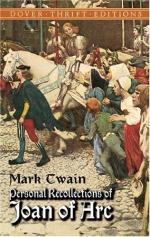Nothing that Joan did escaped notice; everything she did was commented upon and applauded. You could hear the remarks going all the time.
“There—she’s smiling—see!”
“Now she’s taking her little plumed cap off to somebody—ah, it’s fine and graceful!”
“She’s patting that woman on the head with her gauntlet.”
“Oh, she was born on a horse—see her turn in her saddle, and kiss the hilt of her sword to the ladies in the window that threw the flowers down.”
“Now there’s a poor woman lifting up a child—she’s kissed it—oh, she’s divine!”
“What a dainty little figure it is, and what a lovely face—and such color and animation!”
Joan’s slender long banner streaming backward had an accident—the fringe caught fire from a torch. She leaned forward and crushed the flame in her hand.
“She’s not afraid of fire nor anything!” they shouted, and delivered a storm of admiring applause that made everything quake.
She rode to the cathedral and gave thanks to God, and the people crammed the place and added their devotions to hers; then she took up her march again and picked her slow way through the crowds and the wilderness of torches to the house of Jacques Boucher, treasurer of the Duke of Orleans, where she was to be the guest of his wife as long as she stayed in the city, and have his young daughter for comrade and room-mate. The delirium of the people went on the rest of the night, and with it the clamor of the joy-bells and the welcoming cannon.
Joan of Arc had stepped upon her stage at last, and was ready to begin.
Chapter 14 What the English Answered
She was ready, but must sit down and wait until there was an army to work with.
Next morning, Saturday, April 30, 1429, she set about inquiring after the messenger who carried her proclamation to the English from Blois—the one which she had dictated at Poitiers. Here is a copy of it. It is a remarkable document, for several reasons: for its matter-of-fact directness, for its high spirit and forcible diction, and for its naive confidence in her ability to achieve the prodigious task which she had laid upon herself, or which had been laid upon her—which you please. All through it you seem to see the pomps of war and hear the rumbling of the drums. In it Joan’s warrior soul is revealed, and for the moment the soft little shepherdess has disappeared from your view. This untaught country-damsel, unused to dictating anything at all to anybody, much less documents of state to kings and generals, poured out this procession of vigorous sentences as fluently as if this sort of work had been her trade from childhood:




